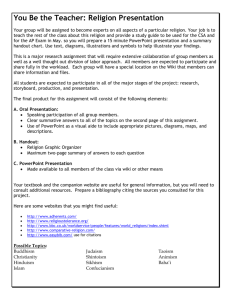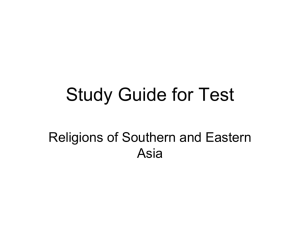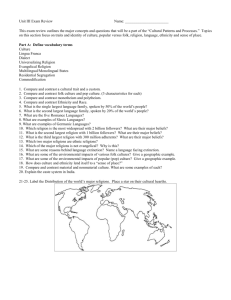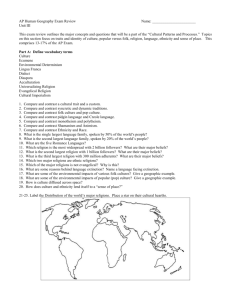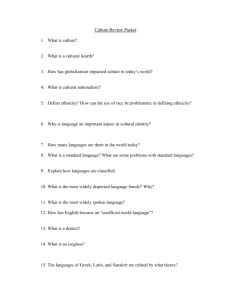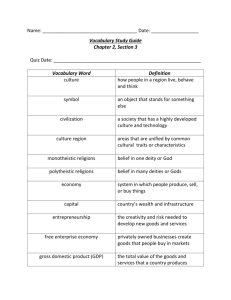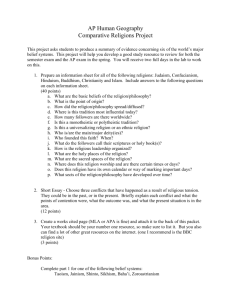DATE: Understanding World Religions and Ethical System
advertisement
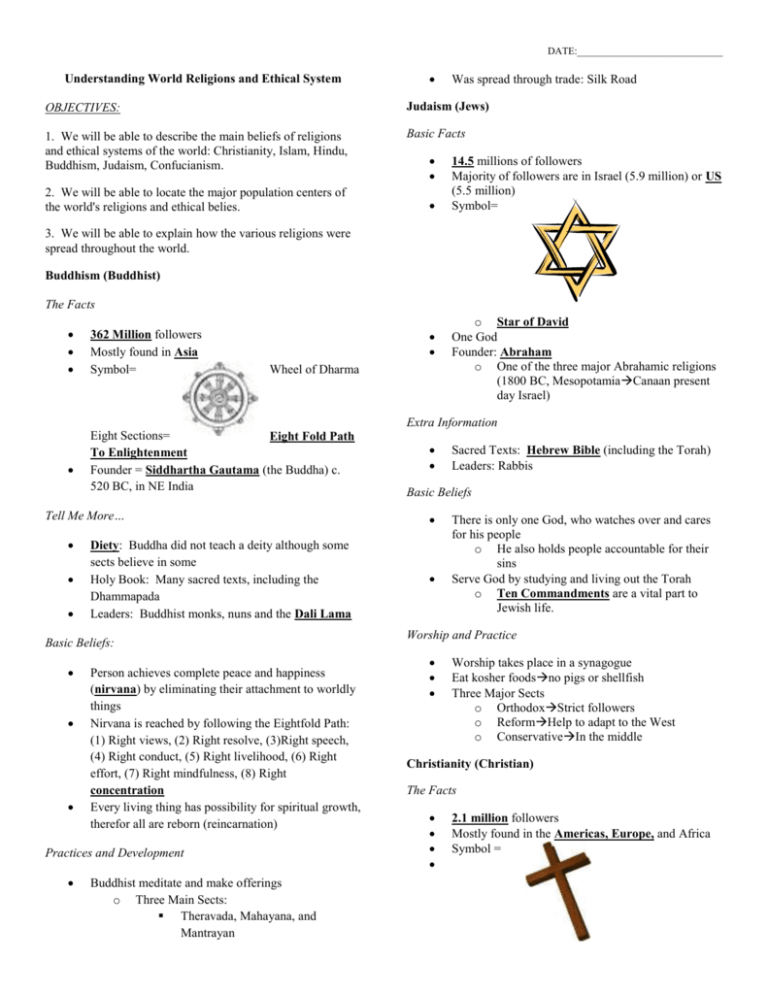
DATE:_____________________________ Understanding World Religions and Ethical System Was spread through trade: Silk Road OBJECTIVES: Judaism (Jews) 1. We will be able to describe the main beliefs of religions and ethical systems of the world: Christianity, Islam, Hindu, Buddhism, Judaism, Confucianism. Basic Facts 2. We will be able to locate the major population centers of the world's religions and ethical belies. 14.5 millions of followers Majority of followers are in Israel (5.9 million) or US (5.5 million) Symbol= 3. We will be able to explain how the various religions were spread throughout the world. Buddhism (Buddhist) The Facts 362 Million followers Mostly found in Asia Symbol= Wheel of Dharma o Star of David One God Founder: Abraham o One of the three major Abrahamic religions (1800 BC, MesopotamiaCanaan present day Israel) Extra Information Eight Sections= Eight Fold Path To Enlightenment Founder = Siddhartha Gautama (the Buddha) c. 520 BC, in NE India Tell Me More… Diety: Buddha did not teach a deity although some sects believe in some Holy Book: Many sacred texts, including the Dhammapada Leaders: Buddhist monks, nuns and the Dali Lama Basic Beliefs: Person achieves complete peace and happiness (nirvana) by eliminating their attachment to worldly things Nirvana is reached by following the Eightfold Path: (1) Right views, (2) Right resolve, (3)Right speech, (4) Right conduct, (5) Right livelihood, (6) Right effort, (7) Right mindfulness, (8) Right concentration Every living thing has possibility for spiritual growth, therefor all are reborn (reincarnation) Practices and Development Buddhist meditate and make offerings o Three Main Sects: Theravada, Mahayana, and Mantrayan Sacred Texts: Hebrew Bible (including the Torah) Leaders: Rabbis Basic Beliefs There is only one God, who watches over and cares for his people o He also holds people accountable for their sins Serve God by studying and living out the Torah o Ten Commandments are a vital part to Jewish life. Worship and Practice Worship takes place in a synagogue Eat kosher foodsno pigs or shellfish Three Major Sects o OrthodoxStrict followers o ReformHelp to adapt to the West o ConservativeIn the middle Christianity (Christian) The Facts 2.1 million followers Mostly found in the Americas, Europe, and Africa Symbol = DATE:_____________________________ Name of Deity-God o Founder-Jesus Christ (~30 AD) from Israel A Few More Facts One of the three Abrahamic religions Holy Book= Bible Leaders: Priests, ministers, monks, nuns and Pope o Husband and Wife o Older Brother and Younger Brother o Friend to Friend Filial Piety vital Education is important for the welfare of the individual and society o Foundation for bureaucracy Islam (Muslim) Basic Beliefs There is only one God, who watches over and cares for his people Jesus Christ was the son of God o He died to save humanity from sin o His death and resurrection made eternal life possible for other Reach salvation by following teachings of Jesus Christ and believing in Christ 1.5 billion followers Mostly found in N. Africa, the Middle East, and Southeast Asia (Indonesia has the largest national population of Muslims) Symbols = Practices and Development Essential to worship are communion, baptism, and praying o Major Christian Sects: Roman Catholic, Eastern Orthodox, and Protestant Spread through trade, exploration, settlement, conquest, and empires (ie. Roman) o Star and Crescent o Confucianism The Facts Not really religion but ethical system 6.3 million followers Mostly found in China, and other east Asia nations Symbol= Yin and Yang o The Name of Allah Name of Deity?Allah(God) Founder-Muhammad (622 AD), and founded in Saudi Arabia FYI o Represents opposite forces in the world working togethersymbolizes the social order and harmony of Confucianism Founder =Confucius in Northeastern China (551 BC) A Little Extra No deity; however, some view Confucius as a god Two Holy Books: Analects, and the Five Classics No designated leaders Basic Beliefs The Basic Beliefs The Five Relationship (How Society Should Be Organized): o Ruler and Subject o Father and Son One of the three major Abrahamic religions Holy Book = Qur’an Main leaders are part of a scholar class called the ulama and the imam Achieve salvation by following the Five Pillars of Islam and living a just life o Sincere reciting the Muslim profession of faith o Performing proper prayers 5x a day o Giving to charity o Fasting during the month of Ramadan o Pilgrimage to Mecca Muhammad = final prophet of Allah Do NOT worship idols or images DATE:_____________________________ Practice and Developments Two Different Sects o Sunni Believe leader should come from Muslim scholar o Shi’a Believe only direct descendants of Muhammad should rule Spread some through trade, but mostly from conquest of empires Contributions o Math, Astronomy, Navigation, Medicine, Physics, Education KEY TERMS FOR THE TOPIC Deity A god or goddess that is the subject of religious worship. Heresy Any words or actions that go against the accepted teachings or practices of a given religion. Monotheism A religion that centers around the worship of one deity. Hinduism (Hindus) Patriarchy Basic Facts 900 million followers Nearly all of the followers are in India Symbol = sacred sound “om” Social system in which leadership, privileges, and inheritance is passed through males from generation to generation. Polytheism A religion that centers around the worship of multiple deities. Name of Deities: o Brahma (Creator), Vishnu (Preserver), Shiva (Destroyer) Founder-No one founder (1500 BC or earlier) Additional Information Several Sacred Texts o The Vedas o The Puranas Leaders of Hinduism o Guru o Holy Man o Brahmin Priest Known for Caste system which goes beyond religionBrahmin at the top & untouchables below Practices and Beliefs After death the soul is reincarnated (reborn in another physical form) based on one's karma from the previous lifetime. o After death the soul is reincarnated (reborn in another physical form) based on one's karma from the previous lifetime. o After death the soul is reincarnated (reborn in another physical form) based on one's karma from the previous lifetime. Believe all life is sacred...remember all souls are reborn Very flexible beliefs Sect A subgroup or division of a larger religion. Religion (Basic Dictionary) The belief in and worship of a superhuman controlling power, esp. a personal God or gods. DATE:_____________________________ KEEP IN MIND: Let’s avoid Ethnocentrism. o judging another culture solely by the values and standards of one's own culture Focus on Cultural Relativism o Not judging a culture but trying to understand it on its own terms. CRASH COURSE VIDEO QUESTIONS: BUDDHISM: 1. When does our story with Buddhism start? 6th Century CE 2. What did Siddhartha encounter that caused him to renounce the crown and caused search for how life could come to such a terrible end ? sick man, old man, a corpse 3. Overall, what did the four noble truths deal with? To rid of desire as that caused all of the suffering which meant to follow the eight fold path. 4. Why was Buddhism popular for those in the Hindu caste system? There was no caste system, and you would not be lower in life Judaism 1. Hebrews developed what central idea that would influence other religions? A belief in one God (monotheism) 2. What is a covenant and why was it important? Agreement between God and Abraham and that his people would populate the Earth Confucianism 1. What did Confucius argue was most important? Follow out past traditions of Sage Dynastyhierarchal structure (ie. Father to Son) 2. What was filial piety and why is it important to Confucianism? Respect of one’s parents and ancestors Islam 1. What did Islam go from in 200 years? Not existing to being the religious and political organizer of one of the largest empires in the world. 2. What is a radical reforming religion? A religion that looked to restore the religion because it had strayed. Hinduism 1. What is the earliest text known for Hindus? Vedas 2. How did the division of Purusha give the organization of caste system? 3. What role does dharma play in Hinduism? It keeps society in order

